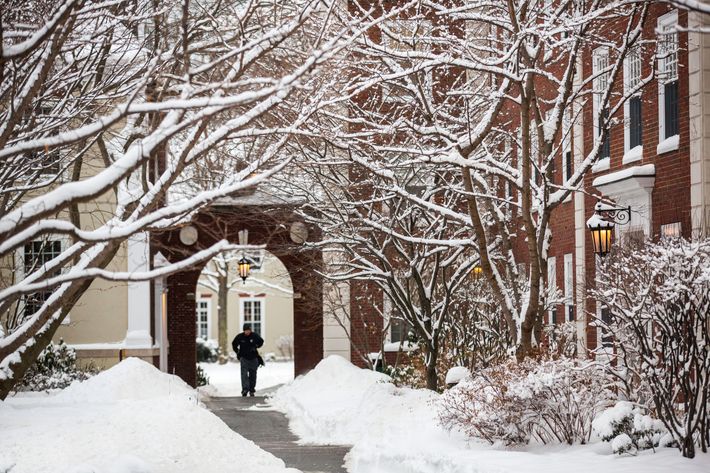
Every five years since our graduation in 2006, I get an email from an old business-school classmate and onetime nemesis asking that I participate in a video spoof for him to show at our reunion. It’s a kind of self-flagellation, because it rehashes an ugly public incident that he and I had caused, which became mildly notorious among our peers. I always participate in the video, not because I feel the need to punish myself, but because the ritual fascinates me. This keeps on going, I think, and the fiction writer in me gets a little thrill. Then I think, who is this for? Is it an apology on behalf of our younger selves? A way of owning the incident — of winning?
Long before I became a writer, I studied at Harvard Business School (MBA ’06) among a privileged population of former bankers and consultants. I hesitate to say that most of my classmates had spent some time in finance, but many had, and they dominated the culture: youth, energy, leadership, money, winning. I was prepared for it — I had spent two years at McKinsey & Co., a company that fed directly into the program. But by the time I packed up my New York apartment and moved to Boston, my values were shifting away from that world. I was an Iranian, an outspoken woman, confused and desperate to do something creative. I had stopped caring about my business career and about making heaps of money, and I think my classmates saw that from the start. I never went to parties. I didn’t network with firms. Mostly I read novels in cafés. I got teaching jobs and avoided the business school with its posh tennis courts and sleek sushi bar. If I thought I saw a display of entitlement, I voiced my disapproval, often loudly.
And so, when it was announced that every student would have to pay $300 into the social activities fund, a pot of money for the 90-person section to throw keggers, scotch tastings, and other boozy, bro-mantic shindigs, I was furious. The fee was a tradition; no one ever refused. The activities were tailored to the majority of the class, only 30 percent of which was female. I was already a $100,000 in debt for this degree, and these guys, many with fat bank accounts, wanted me to subsidize their drinking? I demanded that we substitute a pay-as-you-go system, but I was overruled.
A few weeks later, someone suggested a social event that seemed geared toward women (I don’t remember what it was, maybe brunch). Some liked the idea, but it was abandoned. I spoke up again. I wasn’t always elegant in my objections. In fact, I was often so frustrated that I didn’t know how to defend my point. By year’s end, I had angered not only the (mostly) white, (mostly) male, (mostly) ex-bankers, but everyone else, too. I wanted to scream: You should acknowledge that it’s hard to be a woman here, instead of expecting us to toughen up. You shouldn’t class-shame people into writing a check just so they don’t have to explain their situation. My biggest frustration, I think, was that no one fought the toxic assumption that every graduate goes on to make loads of money. At HBS in 2004 to 2006, the nonprofit recruiters who dropped by spoke to mostly empty rooms.
One winter morning in 2005, we received an email from the administration releasing us from mandatory class attendance due to a snowstorm. I decided not to go. Most others went. The next day in finance class, I asked two or three questions that I might not have asked if I had attended the day before. Some people joked that I should have borrowed someone’s notes. I knew then that I could expect to appear in that week’s “skydecks” — a lighthearted weekly presentation teasing classmates for bad behavior. I was a regular in the skydecks by then, and the jokes were always friendly.
This skydeck was different, though. The day after the storm, without my knowledge, my classmate took photos of the entryway to my apartment and the pavement outside. The photos showed the accumulated snow (not much), my path to class (not long). That Friday afternoon, the entire skydeck was about me. He showed photos of my apartment, of my door and window, and called me out for missing class. He finished with a broad insult to my intelligence. When the presentation ended, the room was silent. I gathered my things and walked out. That weekend, I received dozens of voice-mails, some angry on my behalf, others soothing, offering perspective. Someone sent flowers. I was mortified. I’m sure my classmate had voice-mails too, maybe friends congratulating him, or someone saying he had gone too far. Maybe he felt vindicated, having made an important statement of his own. At the very least, he had been heard, and isn’t that what I had always wanted, too?

Still, I felt drained. For a year I had failed to show anyone the HBS that I saw, and it was all down to my own damn inability to calm down and articulate. The following week, the classmate was asked to apologize in front of the section. Neither of us enjoyed the moment. But neither of us forgot that incident. For me, it was the weekend when I felt like the smallest person in the world, alone in an echo chamber booming with privileged male voices. For him, it was the weekend he thought I’d report him to the ethics committee. Neither of us was justified in our paranoia.
I’ve never been to an HBS reunion, but he always goes. I keep in touch with a handful of my own friends from that time. But just before every reunion, he sends me that email asking to do his quirky video again, to poke fun at ourselves. I always go along. I’ve done videos in which I cross him off a hit list, in which I sit on a curb in sunglasses and claim that it’s snowing. I’ve sent in photos of myself bursting with joy (I’m not sure how he used that one in the end). It’s nice to share a chuckle with someone who once hated me. But I wonder why we have to keep doing this. No one remembers. No one cares. I can guess at the reasoning, though. We hurt the section, and we should show self-awareness and humility. There’s a discipline to it. The message is that we’re laughing about it now … and now … and still now.
So, I told this story to my relatively new partner when this year’s video request dropped into my inbox. “Holy shit,” he said. Then he asked me what would make this incident not feel quite so slimy in my memory — because the phony videos don’t do the trick. I want to say that HBS should examine the daily experiences of its female students, not just their job prospects, especially the women who go along, never complaining or ruining the fun — because they make it harder for anyone else to speak up. HBS should understand that its non-American students will endure a lot before they speak a word, and they should find a better way to hear them. HBS should promote public service and the arts and address classist, everyday social norms. Those things would make me feel vindicated.
Every year or two, I get a rogue email from a classmate remembering how skewed our perspectives were, how grueling it was to dissent. Likely, as we’ve aged, all of our perspectives have shifted. We’re more empathetic, more inclusive. Probably we’re all better at hearing one another. Some of them tell me that they wish they had spoken up for me. They say I was right in principle, but wrong in my mouthy ways. “And look! Look at how far women have come since then in the business world.” These messages are meant for a different version of me, a much younger woman who wanted to be proven right, who thought big wins are the way to change. Now I find the idea of vindication a little sad, the search for it always hollow, because what the seeker actually wants is acceptance and understanding.
By the time we’re 70, I know that my classmates and I will converge even more in our thinking. By then we will have finally elected a female president, appointed more female CEOs, and raised our own daughters and granddaughters. I choose to believe that by then, every one of my classmates will have befriended artists, activists, actual poor people. We will find those old money-flaunting, big-winning, fist-pumping ways crass. Many of my classmates already live this way. Many are progressive and deep-thinking and brimming with kindness. But maybe it’s optimistic to expect us all to change. (This is the school that gave us Steve Bannon, after all, to the shame of many alums, including the 685 women who disavowed him this week.) There will always be those who find release in photographing your doorstep. Vindication is easy to confuse with revenge; and in its purest form it never makes for a satisfying plot point. Real vindication moves at a glacial pace. If you’re even slightly progressive within the context of your community, it will take years for anyone to join in. And by then you’re a different person, and all that once made your blood boil has faded. That’s why I agree to do the videos. It serves as a jolt to the memory, mine and my classmates’, a reminder of how young and silly and vain we were, and probably still are.